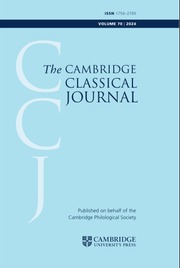No CrossRef data available.
Article contents
TROUBLE AT SEA IN JUVENAL 12, PERSIUS 6 AND THE PROEM TO LUCRETIUS, DE RERUM NATURA 2
Published online by Cambridge University Press: 17 July 2018
Abstract
This paper argues that the shipwreck scene in Juvenal 12 should be read as another exploration of the satiric ‘sketch’ offered in the proem to Lucretius, De rerum natura 2: a thematic response to and exploration of the scene of troubles at sea in the Lucretian proem. The beleaguered sea-merchant Catullus should not have gone sailing at all – but he responds to trouble as an Epicurean would recommend. Juvenal 12 displays Epicurean conceptions of friendship and sacrifice, and an allusion to a storm scene in Persius 6 (itself intertextually connected to Lucretius’ proem) confirms the satiric importance of Lucretius in Juvenal's passage.
- Type
- Research Article
- Information
- Copyright
- Copyright © The Author(s) 2018. Published by Cambridge University Press
Footnotes
For citations of Juvenal and Persius, I use the text of Clausen (1959); for Lucretius, Bailey (1947). All translations are my own. I owe thanks in the preparation of this article to James J. O'Hara, Catherine Keane, Leo Landrey, Caitlin Gillespie, Morgan Grey, Emilia Barbiero, Christopher B. Polt, Sergio Yona, the anonymous referees, and a Summer Writing Grant from the Wake Forest University Humanities Institute.


